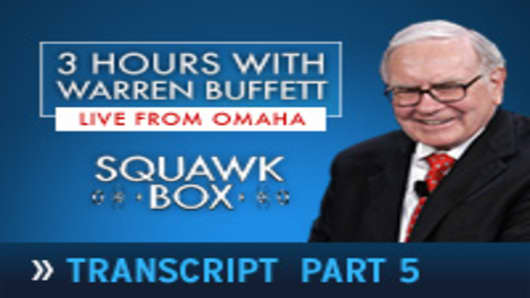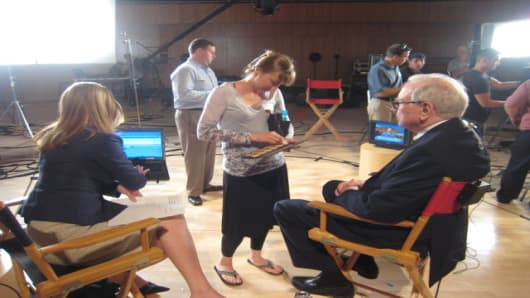QUICK: And--yeah.
BUFFETT: Yeah, and incidentally, that's what happens.
QUICK: Yeah.
BUFFETT: I mean, if you've got a great deal in this country, you don't have to go to Beijing, you know, or the Middle East to find somebody with money to fund it. It's like when oil prospectors would come up here from Texas and they'd say, `We got a wonderful deal for you in Texas,' I always thought, there are all these oil men in Texas, you know, why didn't they call on them?
QUICK: So you think the sovereign wealth funds are getting the raw end of the deal when they buy into some of the financials?
BUFFETT: I think that they are buying what is being sold to them, and in securities you should not buy what's being sold to you. You should buy what comes from your own analysis and looks the cheapest. The idea that somebody is going to come and call on you and say, you know, `Buy $2 billion worth--this is the best thing to buy in the world,' it isn't the best thing to buy in the world. The best thing to buy in the world is something that you've dug out and that people aren't talking about and that, you know, you find yourself. Securities that are being sold to you have a special push in it. Usually, there's extra commissions in them or all kinds of things. So I don't--I don't want to get ideas from other people, basically. I want to get ideas from a bunch of facts that I uncover someplace.
QUICK: A lot of people recently have been talking about the financials, which, once again, people are saying, `Hey, they are reaching levels that inherently make these stocks cheap.' You own some of the financials.
BUFFETT: Yeah, we own--we own some businesses that we think are good businesses and that if the stock market closed for the next three years I'd be happy owning. That's the real test. I mean, if you buy a farm, you don't get a quote on it every day. If you buy an apartment house, you don't get a quote on it every day. You look to the rents or you looked at the crop in the case of the farm. We look to the business. So if I buy stock in a financial, what I'm--what I'm looking at is where I think they'll be in five or 10 years, and I can't pick bottoms. I don't think anybody can. I do want to stay away from the ones that I think are kind of dumbly managed.
QUICK: American Express, Wells Fargo, those are two of your big holdings...
BUFFETT: Right.
QUICK: ...in the financial arena. If you see prices come down and something you've already decided you like this business, if the prices come down, do you buy more?
BUFFETT: Sure.
QUICK: Are you buying more?
BUFFETT: Well, I bought more of one of those, you know, in recent--in recent months.
QUICK: Either American Express or Wells Fargo?
BUFFETT: Now you've got it narrowed down. They--incidentally, both of those companies were started by the same guy, as I--Wells and Fargo started American Express.
QUICK: What makes you look around and think, `Hey, things are getting better'? What would it take to convince you that, `OK, this is'--or is it just simply prices are too cheap and they shouldn't get there?
BUFFETT: Yeah, I don't--if I were going to buy a farm, I know they're going to have a drought, we'll say, two years out of 10. I know prices are going to be lousy, we'll say, two years out of 10. I would rather buy it during the drought, you know, and--or when prices are bad because, you know, I know what it's going to do over time, and the test is to buy it as cheap as you can, something that--where you really have a pretty good fix on what it's going to look like over 10 years. And you're much more likely to buy it when times are bad then when times are good.
QUICK: Is now a time, though, when you'd be looking around at financials you'd never owned a stake in before? Simply because prices have come down, do you start doing more homework? Not something that's getting pitched at you, but do you start looking around to see if anything says, `OK, this one's getting unfairly tarnished'?
BUFFETT: I'm reading far more 10-Ks in the last few months than I've been reading--far more than I was reading three years ago. Yeah, there's--there are more potentially good ideas out there than there were three years ago, and some them are in financials. I mean, I'm looking all the time. And the cheaper they get, the harder I'll look.
QUICK: And you're not just talking about companies here in the United States.
BUFFETT: No.
QUICK: You're looking outside the United States as well.
BUFFETT: Right. Yeah.
QUICK: Is there a particular country that you think is inherently--like with South Korea a few years ago, you said, `Hey, there's got to be some bargains.' Is there another particular country that you look at and say, `Hey, I don't know what they are, but there's got to be something good in there?'
BUFFETT: Well, it's not like South Korea a few years ago. South Korea, you could just turn the page--you could throw darts, you know, with South Korea, and those stocks were really, really cheap. I mean, it's astounding how cheap they were and the world ignored it. PetroChina was ridiculously cheap a few years back, but I--we need to find big things, so I have to look at market caps that are large, and that rules out a whole bunch of countries, because the businesses just aren't that large. And I have to feel I sort of understand the political climate, the taxation climate, that sort of thing, and the attitude towards shareholders. But there's a lot of countries on that, but there's none--nothing--there's nothing like South Korea was five years ago.
QUICK: All right. When you look at what's happening with commodities, we saw a huge boom in commodity prices. We've seen a huge retracement. Oil prices all of a sudden back up around $120 a barrel. But do you think this volatility in commodities prices, has any of that caught you by surprise?
BUFFETT: Well, the dollar's become worth less.
QUICK: Yeah.
BUFFETT: So to the extent that they're quoted in dollars, they haven't gone up as much in Euros or some other kind--in Brazil, the Brazilian currency, you know, has more than doubled against the American currency, so when we look at soybean prices, which happens to be a big product there, it hasn't changed relatively the same way. But, you know, the surprising thing may be that commodities stayed down as low as they were for as long as they did. What happened in oil, we had a change in the supply and demand balance, and that's big in markets. That's what you had in the rail industry, for example. I mean, anytime you get those fundamental changes where, in the case of the rail industry, over a 25-year period the amount of actual rail in the United States declined by 20-odd percent while the ton miles increased 60-some percent. Well, that changes the pricing dynamics, and, you know, that's gone on in oil. It changed the dynamics that there's not a buffer supply like there was five years ago.
QUICK: Which is why you've also bought in to some of the railroad stocks.
BUFFETT: That--I should have done it much earlier. I really missed it entirely. I mean, you could just sit there and watch ton miles go up, rail go down, at some point the pricing power shifts. And, you know, it was ridiculous what the whole rail industry was selling for 10 years ago, and it was also ridiculous that I didn't spot it.
QUICK: But you think that this is still a good place for an investment. You're there for the long haul?
BUFFETT: Well, I'm, as we say in the rail industry, I'm there for the long haul. No, I--we'll be--we've got a big position in Burlington Northern .
QUICK: Burlington, right.
BUFFETT: We'll own it a long time.
QUICK: Warren, we're going to have much more coming up. Again, folks, if you are just tuning in, we are live with the legendary investor in his hometown of Omaha, Nebraska. Much more to discuss this morning. A lot of ground to cover, including what has him a little hot under the collar this morning. Yeah, you don't want to miss a minute of this.




